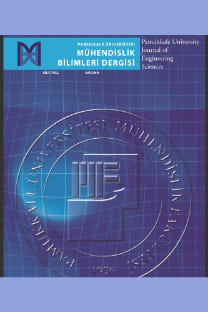Farklı İzolasyon Seviyeleri İçin Düşük Isı Kayıplı Bir Dizel Motorunun Performans Değerlendirmesi
Bu deneysel çalışma bir dizel motoruna farklı izolasyon seviyelerindeki düşük ısı kayıplı motor uygulamasının etkilerinin incelenmesine yöneliktir. Bu amaçla ilk aşamada deney motorunun silindir kapağı ve supapları termal bariyer oluşturmak için yitriya ile stabilize zirkonya (Y2O3–ZrO2) ile kaplanmıştır. Daha sonra silindir kapağı ve supaplara ilaveten deney motorunun pistonları da aynı malzeme ile kaplanmıştır. Deney motorunun özgül yakıt tüketimi, egzoz gaz sıcaklığı, fren ısıl verimi ve hacimsel verimi iki farklı izolasyon durumu için incelenmiştir. Düşük ısı kayıplı motor uygulaması ile motor testlerinin sonucunda özgül yakıt tüketiminde % 4-7,1 iyileşme, egzoz gazı sıcaklıklarında % 3,5–6,8 artış, fren ısıl verimde % 4,1–7,9 iyileşme ve hacimsel verimde % 0,9–2,6 artış tespit edilmiştir. Ayrıca motor performansındaki bu iyileşmelerin deney motorunun izolasyon seviyesi ile orantılı olduğu belirlenmiştir.
Anahtar Kelimeler:
Düşük ısı kayıplı motor, Termal bariyer kaplama, Dizel motoru, Motor performansı.
Performance Evaluation of A Low Heat Rejection Diesel Engine for Different Insulation Levels
This experimental study focuses on investigating of effects of low heat rejection engine application to a diesel engine at different insulation levels. For this purpose cylinder head and valves of the test engine were thermally insulated with yttria-stabilized zirconia (Y2O3–ZrO2) layer at first stage. Then in addition to cylinder head and valves, pistons of the test engine were coated with the same material. Brake specific fuel consumption (BSFC), exhaust gas temperature (EGT), brake thermal efficiency and volumetric efficiency of the test engine were investigated for two different insulation levels. After the engine tests it was determined that BSFC was improved by 4 - 7.1 %, EGT was increased by 3.5 - 6.8 %, brake thermal efficiency was improved by 4.1-7.9 % and volumetric efficiency was increased by 0.9 - 2.6 % with LHR application. It was also determined that these improvements in engine performance are proportional with the insulation levels of the test engine.
___
- Beard, J. 2006. Experimental and computational comparison of a LHR engine with conventionally cooled engine, PhD Thesis, Department of Mechanical Engineering, Colorado State University, Fort Collins Colorado, USA.
- Büyükkaya, E., Engin, T. and Cerit, M. 2006. Effects of thermal barrier coating on gas emissions and performance of a LHR engine with different injection timings and valve adjustments, Energy Conversion and Management. (47), 1298–1310.
- Çengel, Y.A. and Boles, M.A. 1996. Thermodynamics: An Engineering Approach, MacGraw-Hill-Literatür, İstanbul.
- Gatowski, J. 1990. Evaluation of a Selectively-Cooled Single-Cylinder 0,5L Diesel Engine, SAE Paper No: 900693.
- Giakoumis, E.G. 2007. Cylinder wall insulation effects on the first- and second-law balances of a turbocharged diesel engine operating under transient load conditions, Energy Conversion and Management. (48), 2925–2933.
- Haşimoğlu, C. 2005. Düşük Isı Kayıplı Bir Dizel Motorunda Biyodizel Kullanımının Performans ve Emisyon Parametrelerine Etkisi, Doktora Tezi, Sakarya Üniversitesi Fen Bilimleri Enstitüsü, Sakarya.
- Kvernes, I., Norholm, O. and Svartdal, J. 1990. Ceramic Coatings Influences on Medium Speed Diesel Engine Performance and Reliability, Marine Management. 10.
- Parlak, A., Yaşar, H. and Şahin, B. 2003. Performance and exhaust emission characteristics of a lower compression ratio LHR Diesel engine, Energy Conversion and Management. (44), 163–175.
- Parlak, A., Şahin, B. and Yaşar, H. 2004. Performance optimisation of an irreversible dual cycle with respect to pressure ratio and temperature ratio-experimental results of a ceramic coated IDI Diesel engine, Energy Conversion and Management. (45) 1219–1232.
- Parlak, A., Yaşar, H. and Eldoğan, O. 2005. The effect of thermal barrier coating on a turbo-charged diesel engine performance and exergy potential of the exhaust gas, Energy Conversion and Management. (46), 489–99.
- Parlak, A. 2005. The effect of heat transfer on performance of the Diesel cycle and exergy of the exhaust gas stream in a LHR Diesel engine at the optimum injection timing, Energy Conversion and Management. (46), 167–179.
- Sidhu, B.S., Singh, H., Puri, D. and Prakash, S. 2007. Wear and oxidation behavior of shrouded plasma sprayed fly ash coatings, Tribology International. (40), 800–808.
- Reddy, C.S., Domingo, N. and Graves, R.L. 1990. Low Heat Rejection Engine Research Status: Where Do We Go from Here? SAE Paper No. 900620.
- Sun, X., Wang, W. and Bata, R. 1994. Performance Evaluation of Low Heat Rejection Engines, Transactions of ASME. (116) 758-764.
- Yaşar, H., Büyükkaya, E. and Çelik, V. 1996. Application of Thermal Barrier Coating in a Turbocharged DI Diesel Engine, 5th International Combustion Symposium, Bursa, Turkey, 460-468.
- Yaşar, H. 1997. Termal Bariyer Kaplamanın Turbo Doldurmalı Bir Dizel Motorunun Performansına Etkileri, Doktora Tezi, İstanbul Teknik Üniversitesi Fen Bilimleri Enstitüsü, İstanbul.
- Zhou, S. 1995. Studies of a LHR engine designed with conventional lubrication, PhD Thesis, Department of Mechanical Engineering, Colorado State University, Fort Collins Colorado, USA.
- Zhou, H., Yi, D., Yu, Z. and Xiao, L. 2007. Preparation and thermophysical properties of CeO2 doped La2 Zr2 O7 ceramic for thermal barrier coatings, Journal of Alloys and Compounds. (438), 217–21.
- ISSN: 1300-7009
- Başlangıç: 1995
- Yayıncı: PAMUKKALE ÜNİVERSİTESİ
Sayıdaki Diğer Makaleler
Farklı İzolasyon Seviyeleri İçin Düşük Isı Kayıplı Bir Dizel Motorunun Performans Değerlendirmesi
Can Haşimoğlu, Murat Ciniviz, M. Sahir Salman
Su Jeti Teknolojisinin Madencilik Sektöründeki Uygulamalarının Değerlendirilmesi
İzzet Karakurt, Gökhan Aydın, Kerim Aydıner
Süt ve Süt Ürünlerinde Bakteriyosinlerin Kullanımı
Evrim Güneş Altuntaş, Kamuran Ayhan
Tamburlardan Oluşan Antik Mermer Sütunların Deprem Etkisi Altındaki Davranışı
Bengi Arısoy, Ayhan Nuhoğlu, Emre Ercan
Geri Kazanılmış Pet'in Kullanımı
Probiyotikler ve Kullanım Alanları
Serkan Altuntaş, A. Attila İşlier
Mutlu Seçer, Mehmet Emin Kural
Türkiye'nin Otonom Sistem Seviyesinde İnternet Haritasının Çıkarımı ve İncelenmesi
